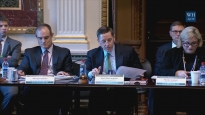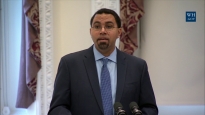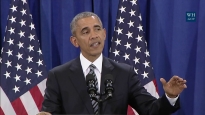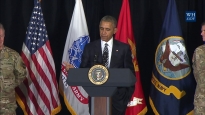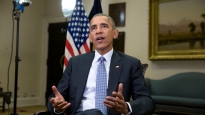President Addresses CEO Business Summit
November 13, 2010 | 14:03 | Public Domain
President Obama speaks of the importance of the economic relationships between the U.S. and Asia in remarks to the APEC CEO Business Summit in Yokohama, Japan.
Remarks by the President to CEO Business Summit in Yokohama, Japan
9:44 A.M. JST
THE PRESIDENT: Thank you so much. Thank you. Good morning. And thank you to Mr. Yonekura for the kind introduction. And thanks to everyone at Nippon Keidanren for hosting APEC’s CEO summit this year.
I also want to thank my good friend, Prime Minister Kan, and the Japanese people for their generosity and their hospitality in hosting APEC. It is wonderful to be back in this beautiful country. And we in America are very much looking forward to hosting APEC next year in my home state of Hawaii.
Now, Yokohama is my last stop on a journey that’s taken me from Mumbai to New Delhi to Jakarta and to Seoul. And in each place, we have deepened friendships, we have strengthened partnerships, and we have reaffirmed a fundamental truth of our time: In the 21st century, the security and prosperity of the American people is linked inextricably to the security and prosperity of Asia. That’s why this was not my first trip here, and why it will not be my last. America is leading again in Asia, and today I’d like to talk about why.
The story of Asia over the last few decades is the story of change that is so rapid and transformative that it may be without precedent in human history. The economic miracle that began here in Japan after the Second World War has now swept across the Pacific and throughout the wider region. Countries where people once lived on a few dollars a day are now some of the fastest-growing economies in the world, with incomes and living standards that few could have imagined 40 or 50 years ago.
For example, when I lived in Jakarta as a young boy, I can remember the buildings being no more than a few stories tall. There was just one modern shopping center. On Tuesday, I returned to a teeming city of nearly 10 million, filled with skyscrapers and thriving centers of culture and commerce. In Seoul, I noted that there are Koreans who can still remember when their country was little more than rice paddies and small villages. And today it is one of the most prosperous democracies in the world. When I was in Mumbai, I met with young entrepreneurs who were putting American technology into Indian electric cars, and selling clean water to Indians from filtration equipment purchased from the United States. These are breakthroughs that will continue to fuel growth in a nation that has already lifted millions from poverty.
In barely two generations, these sweeping changes have improved the lives and fortunes of millions of people here in the Asia Pacific. But in today’s interconnected world, what happens in Japan or China or Indonesia also has a direct effect on the lives and fortunes of the American people. That’s why I came here.
The Asia Pacific is where the United States engages in much of our trade and our commerce; where our businesses invest and where we attract investment to our shores; where we buy and where we sell many of our goods and services -– exports that support millions of jobs for our people.
Seven of America’s 15 top trading partners are now APEC members. Sixty percent of the goods we export go to this region of the world. The United States is also the largest export market for Asia, which has led to more affordable goods and services for American consumers.
And what’s more, this is a relationship that will only become more important as this region continues to grow. Within five years, Asia’s economy is expected to be about 50 percent larger than it is today. And for at least the next four years, Asia Pacific economies will grow faster than the world average.
Now, undoubtedly, this rapid growth will lead to a healthy competition for the jobs and industries of the future. And as President of the United States, I make no apologies for doing whatever I can to bring those jobs and industries to America. But what I’ve also said throughout this trip is that in the 21st century, there is no need to view trade, commerce, or economic growth as zero-sum games, where one country always has to prosper at the expense of another. If we work together, and act together, strengthening our economic ties can be a win-win for all of our nations.
Now, that cooperation was on display yesterday at the first G20 summit in an Asia Pacific nation. Having successfully worked together to avoid global depression, our challenge now is a global recovery that is both balanced and sustained. Yesterday, there was a broad agreement on the way forward -– an agreement based on the framework that we put forward.
First, we agreed to keep focusing on growth. As the largest economy in the world, an engine for global growth, that’s particularly important for the United States. As Prime Minister Singh of India said when I was visiting there, “a strong, robust, fast-growing United States is in the interests of the world,” and “would help the cause of global prosperity.”
And that’s why we passed an economic plan that has led to five consecutive quarters of economic growth and 10 consecutive months of private-sector job growth. That’s why we passed and are implementing the toughest set of financial reforms since the Great Depression -- something that our G20 partners need to do with the same sense of urgency.
And that’s why we’re cutting back on non-essentials in the face of serious fiscal challenges. Already, we’re on track to meet our goal of cutting our deficit in half by 2013. And I’m absolutely committed to making the tough choices necessary to get us the rest of the way there and bring down our deficits in the long run.
But we are not cutting back on the investments that are essential to America’s long-term economic growth: education, clean energy, research, and infrastructure. We will make sacrifices, but everyone here should know that as long as I’m President, we are not going to sacrifice America’s future or our leadership in the world.
The second major thing we agreed on in Seoul was that in order for the recovery to be sustained, economic growth must be balanced. One of the important lessons the economic crisis taught us is the limits of depending primarily on American consumers and Asian exports to drive economic growth.
Going forward, countries with large surpluses must shift away from an unhealthy dependence on exports and take steps to boost domestic demand. As I said, going forward, no nation should assume that their path to prosperity is simply paved with exports to America.
In the United States, we see the need for rebalancing as an opportunity to rebuild our economy on a new, stronger foundation for growth -– where we save more and we spend less; where we’re known not just for what we consume, but what we produce. We want to get back to doing what American has always been known for: discovering, creating, and building the products that are sold all over the world.
And that’s why I’ve set a goal of doubling U.S. exports over the next five years. This is a big part of what brought me to Asia this week. In this region, the United States sees a huge opportunity to increase our exports in some of the fastest-growing markets in the world.
For America, this is a jobs strategy, because with every $1 billion we sell in exports, 5,000 jobs are supported at home. And jobs supported by exports pay up to 18 percent higher than the national average. Meanwhile, for Asia Pacific nations, these U.S. goods and products also provide more choice for consumers who are enjoying higher standards of living throughout the region. This is a win-win for all of us.
Over the course of this trip, we’ve made good progress toward our export goals. While we were in India, I was pleased to announce a set of trade deals that total nearly $10 billion in U.S. exports. From medical equipment and helicopters to turbines and mining equipment, these deals support more than 50,000 jobs in the United States.
In Indonesia, a fast-growing market where we have been steadily increased our exports, President Yudhoyono and I discussed ways to encourage additional trade and investment between our nations.
And in South Korea, President Lee and I moved closer to completing a trade deal. There are some outstanding issues that are difficult, and we need to get a deal that is good for American workers and businesses. But completion of this deal could lead to billions of dollars in increased exports and thousands of American jobs for American workers. So I’m committed to seeing this through, and I’m pleased that President Lee offered to send a team of negotiators to Washington in the coming weeks so we can try to finish the job.
The United States is also looking to expand trade and commerce throughout the Asia Pacific. Even though our exports in this region have risen by more than 60 percent over the last five years, our overall share of trade in the region has declined in favor of our competitors, and we want to change that. We don’t want to lose the opportunity to sell our goods and services in fast-growing markets. We don’t want to lose the opportunity to create new jobs back home. That’s why we want to keep working with our fellow APEC economies to reduce trade barriers. And that’s why we want to pursue the Trans-Pacific Partnership, which would facilitate trade and open markets throughout the Asia Pacific.
Agreements like this will obviously benefit our economies and our people, but they will also send a strong signal that when it comes to this growing, sprawling region of the world, the United States is here to stay. We are invested in your success because it’s connected to our own. We have a stake in your future because our destiny is shared. It was a Japanese poet who said, “Individually, we are one drop. Together, we are an ocean.” So it must be with the billions of people whose lives are linked in the swirling currents of the Pacific.
In the last century, the American people have contributed greatly to the security and prosperity of this region. The strength of our alliances and the bravery of our men and women in uniform helped keep the peace. And the openness of our markets helped to fuel the rise of the Asian Miracle.
In this young century, we stand ready to lead again. Yes, we’ve gone through a difficult time and there are challenges that remain that are great. There will be setbacks and disagreements and we won’t solve every issue in one meeting or one trip or even one term of my presidency.
But I’ve never been more confident in what the United States of America has to offer the world at this moment in history -– in our universities and our research centers that continue to produce the most promising minds and discoveries and innovations; in our businesses that keep developing products and technologies that are transforming the lives of millions; in the spirit of tolerance and diversity that sends a powerful example to a world that is smaller and more connected than at any time in human history; and in the most effective form of government the world has ever known -- namely, democracy. For it will always be true that when leaders are accountable to their people, their people are more likely to prosper.
Indeed, what has characterized America from the start, the idea of America that endures, is particularly indispensable in times of great challenge and great change.
It’s the idea that led us westward and skyward, to roads and railways that cut through wilderness, to ships and planes and fiber optic lines that carry American commerce around the world. It is the idea that through hard work and sacrifice, it is possible to end up in a better place than where you started, and it’s possible to give your children chances you never had. And it’s the idea that even when circumstances seem bleak and challenges seem daunting, it is possible to overcome, to persevere and ultimately to succeed.
In different ways and different places over the last week, I’ve seen this idea alive in the teeming, thriving democracies of Asia. And that gives me great confidence in the ties that bind our people, and great hope in our ability to move together towards the future –- not as drops, but with the strength of an ocean.
So I thank you for your hospitality. I congratulate all the outstanding businesses who are here today. And I look forward to our close cooperation in the months and years to come. Thank you very much. (Applause.) Thank you. (Applause.)
END 9:58 A.M. JST
|
December 7, 2016
|
December 7, 2016
|
December 7, 2016
|
December 6, 2016
|
|
December 6, 2016
|
December 5, 2016
|
December 4, 2016
|
December 3, 2016
|
- &lsaquo previous
- …
- 3
- 4
- 5
- 6
- 7
- 8
- 9
- 10
- 11
- …
- next &rsaquo

